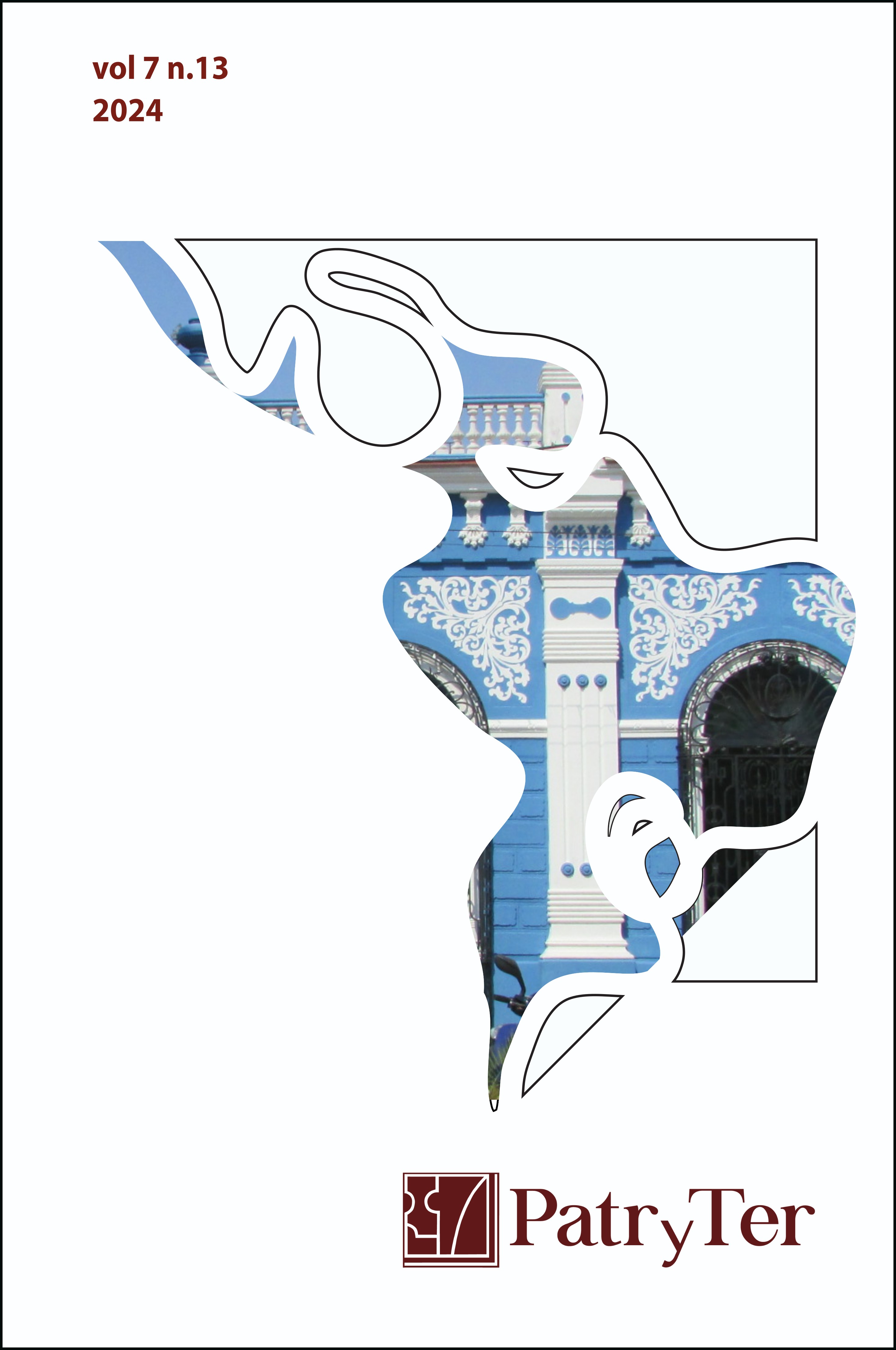The uses of the territory and the landscape-memory in Latin America and the Caribbean
DOI:
https://doi.org/10.26512/patryter.v7i13.54069Keywords:
Editorial. landscape-memory. used territory. Estrellita García Fernández. PatryTerAbstract
This editorial from vol. 7, no. 13 of PatryTer – Latin American and Caribbean Journal of Geography and Humanities recovers two fundamental operational categories of Geography, the uses of the territory and the produced landscape, to address a synthesis problematization. In this issue we also pay tribute to Dr. Estrellita García Fernández, a Cuban colleague living in Mexico, who died in July 2023 and served as a professor and researcher at the University of Guadalajara and El Colegio de Jalisco.
Downloads
References
Almeida, N., & Faria, M. (2021). Entrevista a Milton Santos, una mirada a los 70 (25 años después) . PatryTer, 4(8), 1–10. https://doi.org/10.26512/patryter.v4i8.38283
Arroyo, M. (2017). A América Latina numa encruzilhada: ocaso do projeto de integração? [Latin America at a crossroads: decline of the integration project]. GeoTextos, 13(1), 13-28. http://dx.doi.org/10.9771/1984-5537geo.v13i1.23363
Cabrales, L. (2018). Paisaje industrial y sus representaciones: La fábrica “La Parisiense” de Guadalajara durante el Porfiriato. PatryTer, 1(2). https://doi.org/10.26512/patryter.v1i2.9355
Costa, E. (2014). Paisagem-memória e função social da fotografia. In V. Steinke, D. Reis Jr., E. Costa. Geografia & Fotografia apontamentos teóricos e metodológicos. Brasília: Lagim/UnB.
Costa, E. (2018). Proyecto Político-Académico de la PatryTer - Revista Latinoamericana y Caribeña de Geografía y Humanidades. PatryTer, 1(2), 1-15. https://doi.org/10.26512/patryter.v1i2.12298
Costa, E. (2021). Patrimonio-territorial y territorio de excepción en América Latina, conceptos decoloniales y praxis. Revista Geográfica Venezolana, 62(1), 1-28. https://doi.org/10.53766/RGV/2021.62.01.05
Costa, E. (2022). Entrevista y homenaje a Francisco Capuano Scarlato. Geografía y la vida en la metrópolis. PatryTer, 5(10), 5–17. https://doi.org/10.26512/patryter.v5i10.44315
Costa, E. & Alvarado, I. (2021). Territorio usado, turismo e cinema: proposta metodológica. Finisterra, 56(118), 175–198. https://doi.org/10.18055/Finis22285
Costa, E. & Cadena, G. (2023). La Geografía en Venezuela. Encuentro y homenaje a Delfina Trinca Fighera. PatryTer, 6(12), e48989. https://doi.org/10.26512/patryter.v6i12.48989
Costa, E. & Moncada, J. (2021). Decolonialidad originaria latinoamericana y condicionamiento barroco del territorio novohispano: conventos, presidios y pueblos de indios. Cuaderno de Geografía. Revista Colombiana de Geografía, 30(1), p. 3-24. https://doi.org/10.15446/rcdg.v30n1.80924
Costa, E., Nieto, M., & Pinassi, A. (2023). Entrevista y homenaje a Roberto Bustos Cara. La Geografía en Argentina y Bahía Blanca. PatryTer, 6(11), 01–12. https://doi.org/10.26512/patryter.v6i11.47243
García Fernández, E. (2023). Paisaje urbano histórico y segregación socioespacial en Zapopan, México. PatryTer, 7(13), 01-17. https://doi.org/10.26512/patryter.v7i13.44478
Núñez, B., Cabrales, L. & Costa, E. (2023). Homenaje a Estrellita García Fernández. Cuerpo, mente y espacio-tiempo. PatryTer, 7(13), 01–09. https://doi.org/10.26512/patryter.v7i13.51614
Santos, M. (1999). O dinheiro e o território. GEOgraphia, 1(1), p. 1-13. https://doi.org/10.22409/GEOgraphia1999.v1i1.a13360
Silveira, M. (2011). Território usado: dinâmicas de especialização, dinâmicas de diversidade. Ciência Geográfica, XV(1), 4-12.
Souza, M. & Costa, E. (2022). De tempos e ritmos, homenagem a Carlos Augusto Figueiredo Monteiro - geógrafo brasileiro. PatryTer, 5(9), 5-9. https://doi.org/10.26512/patryter.v5i9.40528
Souza, M. (2019). Território usado, rugosidades e patrimônio cultural: ensaio sobre o espaço banal. PatryTer, 2(4), 1-17. https://doi.org/10.26512/patryter.v2i4.26485
Downloads
Published
How to Cite
Issue
Section
License
Copyright (c) 2024 PatryTer

This work is licensed under a Creative Commons Attribution-NonCommercial-NoDerivatives 4.0 International License.
Please be advised that Revista Patryter is licensed under a Creative Commons Attribution-NonCommercial-NoDerivatives 4.0 International License (CC BY-NC-ND 4.0) https://creativecommons.
Authors who publish in the PatryTer Magazine agree to the following terms:
- Authors retain the copyright and grant the journal the right of first publication, the work being simultaneously licensed under the Creative Commons Attribution License which allows the sharing of the work with recognition of the authorship of the work and initial publication in this journal.
- The contribution is original and unpublished and is not being evaluated for publication by another journal. When submitting the article, authors should attach as a supplementary document a Letter addressed to the PatryTer's Editor, indicating the academic merits of the submitted work (relevance, originality and origin of the article, that is, from what type of research]. This letter must be signed by all authors.
- Authors assign the copyright of the work that they present to the Editorial Board of PatryTer Magazine, which may serve the article in the PatryTer Magazine and in public and private databases in Brazil and abroad.
- Authors declare that they are fully responsible for the entire contents of the contribution that they submit to the Editorial Board of PatryTer Magazine.
- Authors declare that there is no conflict of interest that could interfere in the impartiality of the scientific papers submitted to the PatryTer Magazine Editorial Board.
- Authors are authorized to take additional contracts separately, for non-exclusive distribution of the version of the work published in this journal (eg publish in institutional repository or as a book chapter), with acknowledgment of authorship and initial publication in this journal.
Authors are allowed and encouraged to publish and distribute their work online (eg in institutional repositories or on their personal page) at any point before or during the editorial process, as this can generate productive changes as well as increase the impact and the citation of the published work (See The Effect of Free Access).




